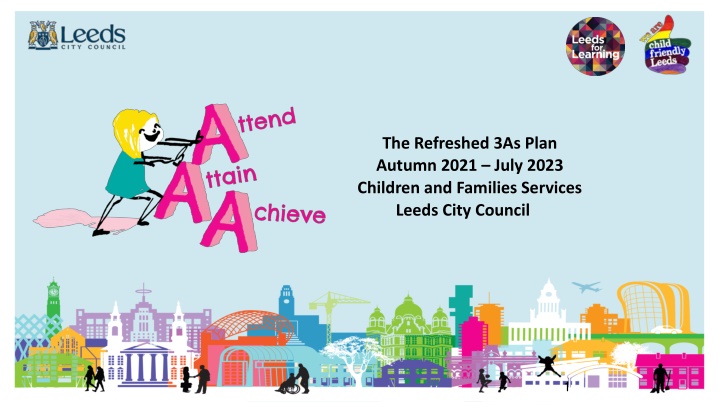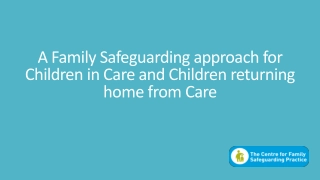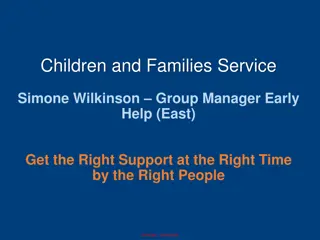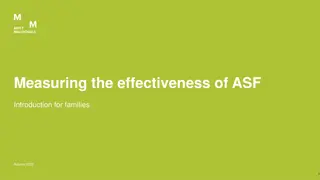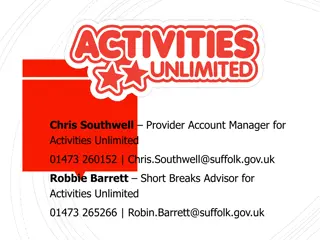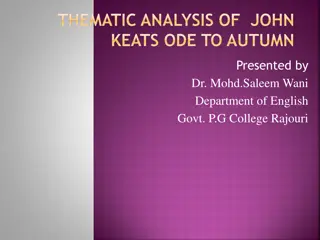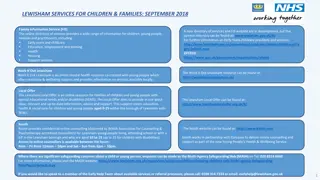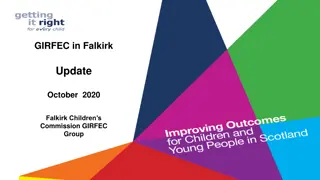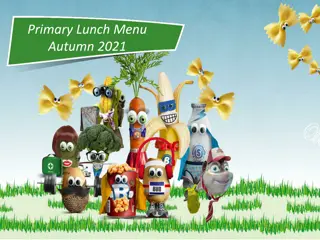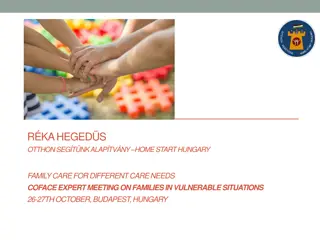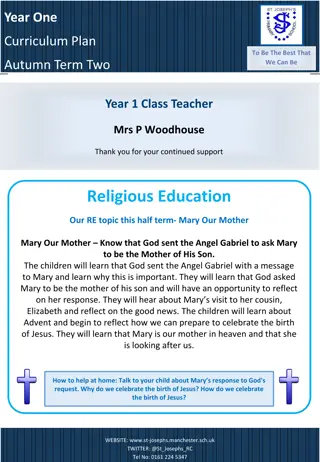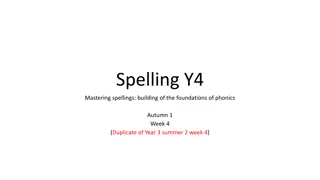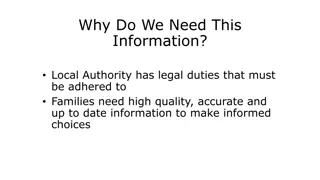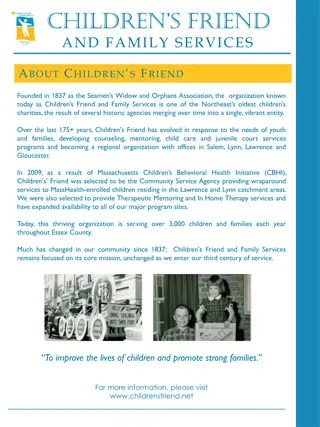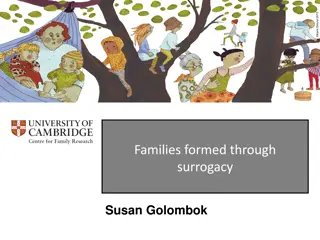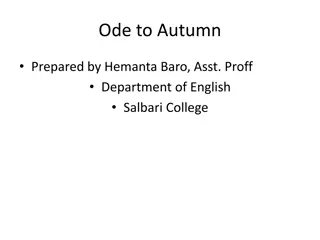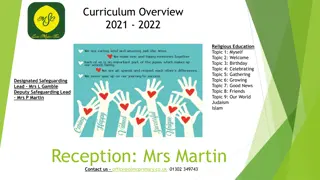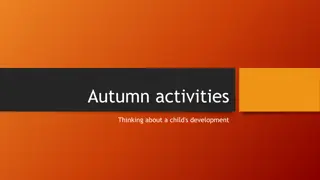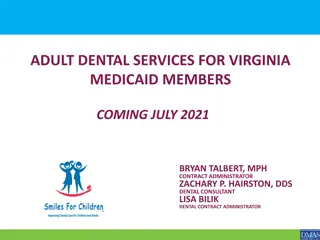Refreshed 3As Plan Autumn 2021 - July 2023 for Children and Families Services
The Refreshed 3As Plan for Children and Families Services by Leeds City Council aims to improve attendance, attainment, and achievement in education settings. It has been reshaped to address the impacts of the pandemic on children's health, wellbeing, and learning. The plan outlines five priorities to enhance focus and support education settings in Leeds, with a commitment to tackle poverty and reduce inequalities. Governance, leadership, and partnerships are key components, ensuring accountability and regular evaluation of performance indicators.
Download Presentation

Please find below an Image/Link to download the presentation.
The content on the website is provided AS IS for your information and personal use only. It may not be sold, licensed, or shared on other websites without obtaining consent from the author.If you encounter any issues during the download, it is possible that the publisher has removed the file from their server.
You are allowed to download the files provided on this website for personal or commercial use, subject to the condition that they are used lawfully. All files are the property of their respective owners.
The content on the website is provided AS IS for your information and personal use only. It may not be sold, licensed, or shared on other websites without obtaining consent from the author.
E N D
Presentation Transcript
The Refreshed 3As Plan Autumn 2021 July 2023 Children and Families Services Leeds City Council 1
Introduction In 2018, the 3As Plan was developed by Children and Families Services to deliver the third obsession set out in the Leeds Children and Young People s Plan (CYPP), to improve attendance, attainment and achievement in education settings across Leeds. We decided to re-evaluate our plans due to the significant, immediate and longer-term impacts of the pandemic on the health, wellbeing and learning of our children and young people. In reshaping our plans, we have been keen to hear the views of people working in early years provisions, our schools, and colleges. In summer 2021, we consulted education leaders in Leeds, in a series of Big Learning Conversations, to hear their priorities and concerns. The plan has been shaped by what they told us. This Refreshed 3As Plan has also been informed by the most recent data we have for the city. The Annual Standards Report for 2018-19 showed that Leeds is behind other authorities on headline measures for early years, phonics screening and reading, although young people in Leeds do make accelerated progress throughout their school years and by age sixteen achieve results broadly in line with the rest of the country. Our Leeds vision, as expressed in the Council s Equality and Diversity Policy, is to tackle poverty and reduce inequalities that still exist. We recognise some groups such as those with English as an Additional Language and children from disadvantaged backgrounds have been disproportionally affected by the pandemic. 2
This is not a plan for schools and other settings, as we recognise that each early years setting, school, academy, and college will have its own priorities and development plan, but rather a plan to shape our focus and offer in helping schools to support improved outcomes for children and young people. Our refreshed plan has five priorities and details how Children and Families Services will enhance focus on some key areas to support education settings to support all children and young people s learning. Of course, there are strategies in place across the directorate which focus on specific areas of need and which sit alongside our Refreshed 3As Plan, for example, the SEND Strategy. We look forward to working with settings, partners, children, and their families to offer the best possible opportunities for all children and young people to attend, attain and achieve. Cllr Jonathan Pryor Cllr Fiona Venner Deputy Leader and Executive Member Director Executive Member for Adult and for Economy, Culture Children s Social and Education Care and Health Partnerships Saleem Tariq Shaheen Myers Julie Longworth Deputy Director Children Children Children and and and Families Families Services Services Services Deputy Director Families 3
Governance, leadership and partnerships Each of the 5 priorities is led by the appropriate Head of Service within Children and Families Services, who will complete a half termly summary evaluation. These will be presented at the Good Learning Places Board, a board which will consist of Heads of Service and Deputy Directors from across the directorate. Summary evaluations will include relevant information and evaluations against the key performance indicators providing an outline of success, areas for improvement and risk management. The board will hold lead officers to account through high challenge and support and will form part of the regular review and delivery cycle. Priority 1 Priority 2 Lead: Head of Service for Learning Improvement Lead: Head of Service for Learning Inclusion Good Learning Places Board Lead: Deputy Director for Children and Families Services (Learning) Priority 5 Priority 4 Head of Service for Learning Improvement Head of Service for Learning Systems Lead: Head of Service for Learning Systems Priority 3 Lead: Head of Service for Learning Inclusion
Performance and priorities Priority 1 - All children in Leeds are supported to improve their fluency in reading taking into account their individual needs. Priority 2 All children, young people and families are supported to access and regularly attend early years education settings, schools, and post-16 education settings to benefit from learning opportunities, protective factors, and enrichment activities. Priority 3 Children and young people with Special Educational Needs and Disabilities and their families receive timely and appropriate support to achieve their best possible outcomes and prepare for adult life. Priority 4 All children and staff working in learning settings are supported with their wellbeing. Priority 5 - All children make the best start to each stage of their learning. 5
Priority 1 - All children in Leeds are supported to improve their fluency in reading taking into account their individual needs. Service lead: Dave Clark, Head of Service for Learning Improvement Rationale Pupils who can read fluently are able to make progress with their learning. They have a key skill which will help them manage day to day life, both as a child and an adult. They can benefit emotionally through reading stories and understanding their own feelings and those of others. There are stark reminders in society which underline what can happen when children do not develop these basic literacy skills. For example, 25% of young offenders have reading skills below those of the average seven- year-old, whilst 60% of the prison population experience difficulties in basic literacy skills. Pupils take the phonics screening check at the end of year 1 (typically aged 6) to test their proficiency at word reading. In Leeds in 2019, 20% of children did not meet the phonics test threshold and therefore, entered year 2 without the basic literacy skills to access the curriculum. Many young children s development as readers will have been hampered by the pandemic. One report s findings on lost learning from the first lockdown estimated that the average loss for reading in the Yorkshire and Humber region was 2.8 months. https://cdn.literacytrust.org.uk/media/documents/2008_11_15_free_research_-_Literacy_changes_lives_2008__offending_behaviour_JYS9ScS.pdf https://epi.org.uk/publications-and-research/department-for-education-publishes-new-epi-research-on-pupil-learning-loss/ 6
Action 1 - All Leeds primary schools will be offered a one day on site reading deep dive review over the next two years. How? Impact We will provide schools with a reading audit tool prior to reading reviews so leaders can self- evaluate their own provision. This will form the starting point to the review, which will be a collaborative process and follow the Ofsted deep dive format. The process will be underpinned by a quality assurance framework. The review will generate a report with clear actions for development. Advisers and consultants will meet regularly to discuss the emerging themes, which will inform next steps. Grade 3 schools (requires improvement), grade 4 schools (inadequate) and grade 2 schools (good) but declining, as well as those expecting an inspection, will be prioritised. The review will be free of charge to all LA maintained schools and available at our standard adviser rate for non-maintained schools and academies. Improvement in outcomes from the phonics screening test. Learning Improvement offer will be more clearly aligned to the needs of schools. Ofsted reports will be positive about the quality of the reading curriculum in Leeds schools. Key performance indicator 100 reading deep dive reviews will have been carried out by the end of the academic year 2021/22. Further measures A training offer will be developed for secondary settings to support staff working with pupils who struggle to read. There will be a comprehensive early reading training offer to support staff in schools. We will signpost best practice and highlight opportunities for system leaders to support other schools in developing a good quality reading curriculum.
Action 2 - There is an offer to all primary schools to access Level 1 training: Meeting the needs of children with specific learning differences (SpLD) and literacy difficulties. How? We will provide a 2 day training course per term (subsidised by LCC) for 2 members of staff per school. The training is aimed at the special educational needs co-ordinator (SENCo) and literacy/English lead in school. This capacity building training looks at the definition of a specific learning difficulty (SpLD), why some pupils struggle with reading (and spelling), plus the identification of need thorough assessment, and removing barriers to learning through Quality First Teaching (QFT) and reasonable adjustments to classroom provision. In addition, each participating school can access a free eLearning training video for all staff. Meeting the needs of children with SpLD and Literacy difficulties (Primary) | Leeds for Learning Key performance indicator 40 schools will have accessed training by the end of the academic year 2021/22. Impact Improved identification of need and improved parental confidence in the meeting of needs. Improved provision and outcomes for pupils with specific learning difficulties (SpLD). Gap between Leeds and national in the identification of SpLD is narrowed (SEN census codes).
Action 3 - Social workers in Leeds work with some of the most vulnerable children in the city, many of whom struggle with basic literacy. Families want to support their children but often do not know how to do so. In the DfE Reading Framework, which was published in July 2021, appendix 1 gave simple but useful guidance to parents about how they can read to their children to make this a pleasurable and worthwhile experience. We want this simple guide to be shared with families where there is social care involvement. How? The appendix will be developed into an accessible format. Social work teams will be offered training to support the understanding of reading and parent/child reading strategies and the use of the DfE guidance. We will create a video clip, for families, of a parent employing these strategies when reading to their child. We will make these resources available on the Leeds City Council website. Social work teams will signpost families to this. Families without digital access will receive paper copies of support and guidance translated into language and accessibility as appropriate. Key performance indicator All families with involvement with Children s Social Care will be given the advice on how to read to their child which is positive and encouraging, considering the pressures and illiteracy of families. In these instances, further training will be signposted for families to access. This will be achieved by April 2022. Impact Children will listen to books for pleasure and enjoy the reading experience. Children will build up a wider vocabulary over time. The reading experience will help develop close and nurturing relationships in families.
Aligned links to local authority plans and what learning leaders say Tackling the long term impacts of Covid 19 on children and families draft inquiry report recommendations: Work with schools to ensure that pupils receive good quality phonics teaching enabling them to become proficient readers, access the curriculum and read independently. Child Friendly Leeds young people s wishes: All our learning places identify and address the barriers that prevent children and young people from engaging in and enjoying learning. Learning leader comment during the Big Learning Conversations: It has to be about storytelling, language development, story books and images, and developing vocabulary . 10
Priority 2 All children, young people and families are supported to access and regularly attend early years education settings, schools, and post-16 education settings to benefit from learning opportunities, protective factors, and enrichment activities. Service lead: Val Waite, Head of Service for Learning Inclusion Rationale Children who have strong attendance in learning settings are more likely to fulfil their potential and achieve their best possible outcomes in education. Access to education settings also keeps children safe from harm, promotes protective factors such as positive relationships with adults and ensures access to targeted services which sit around schools and settings. It provides the opportunity to access enrichment activities wider than solely the academic, such as sports, the arts, and volunteering. Regular attendance also enables children and young people to develop good routines and habits which prepare them well for the world of work. Absence rates in Leeds have been higher than absence rates nationally and this has implications for outcomes of pupils. A DfE research paper in 2016 found that pupils with no absence are 1.5 times more likely to achieve five or more GCSEs A*-C (now 5-9) than pupils missing 15-20% of key stage 4 lessons. The pandemic has, as expected, affected attendance especially for learners who may be more vulnerable to missing education, lower attendance at, or exclusion from, education settings. Some young pupils and their families have been anxious about returning to school, and there has been a rise in the number of children missing in education and in families opting to home educate their child. The change in routines and past experiences has destabilised some young people which may now be negatively affecting attendance and behaviour. https://assets.publishing.service.gov.uk/government/uploads/system/uploads/attachment_data/file/412638/The_link_between_absence_and_attainment_at_KS2_and_KS4.pdf 11
Action 1 - The Attendance Service will contact every school in Leeds to offer a review of the attendance register. Impact How? Improved accuracy with attendance registration in Leeds schools and inaccuracies eradicated. Attendance personnel in Leeds schools are knowledgeable about DfE attendance guidance and legislation and confident in implementing it. A review of the attendance register will support schools to evaluate their current practice and outline any areas of training needs in relation to their recording practices around attendance coding. This will also ensure schools meet all statutory duties. The reviews will be carried out by the attendance personnel working collaboratively with the school. They will produce a report with clear recommendations and signpost any further training or development work. Further measures We will ensure that all schools have a clear document which outlines schools responsibilities and duties regarding attendance and children missing out on education. The umbrella document will be disseminated via a package of training open to all LA colleagues/social workers, area inclusion partnerships (AIP) and clusters to outline expectations, roles and responsibilities, and the graduated approach of support around the 3As for children, young people, families, schools and practitioners. The Attendance Service will offer a variety of training for professionals working with families. This will include training for social workers, AIP and cluster staff to support the attendance of vulnerable children. The Attendance Service will also offer school professionals training on attendance, including training to school governor teams and leadership colleagues and AIP personnel on fixed term and permanent exclusion legislation. Key performance indicator All primary and secondary schools will have been invited to have an attendance review and, where accepted, the review will have been undertaken by July 2022.
Action 2 - Monthly liaison will take place between Learning Improvement and the Attendance Service to discuss school level attendance data and identify issues that will be raised with schools via learning colleagues. How? Regular meetings will be held between senior advisers and attendance officers to explore patterns, trends and emerging issues arising from the data and what actions can be implemented to follow up identified issues. Key performance indicator Impact Improved attendance levels across the city using pre- pandemic data as a basis in July 2022: Total absence figure for all schools. Improved attendance levels at schools with identified need. Greater awareness of attendance issues within Learning Improvement that will lead to more purposeful and productive discussions with schools about their identified priorities. Days lost to fixed term exclusions.
Action 3 - We will increase the take up of free early education entitlement (FEEE) for children aged 2, 3 and 4 years old, with a targeted focus in areas of high deprivation and where take up is low. How? We will re-establish the focus group linking sufficiency, early help teams, local providers including schools and children centres to develop a targeted approach that works with families in these areas to promote the benefits of early education. We will ensure all providers are working together sharing best practice across settings and with local children centre family outreach teams, to promote vacancy information. We will work with clusters and wider teams/services as part of the NESTA project. Key performance indicators Increase in take up of FEEE within areas of high deprivation and historical low take up. Impact Improving education and development of children at an early age and readiness for school. Improving attainment at the end of foundation stage and closing the gap between those with an early education and those without.
Aligned links to local authority plans and what learning leaders say Best City Plan: Priority 4: Increase the number of children and young people participating and engaging in learning. Child Friendly Leeds Young People s Wishes: All our learning places identify and address the barriers that prevent children and young people from engaging in and enjoying learning. Learning leaders told us during the Big Learning Conversations: We must help parents understand the importance of learning and how vital it is that their children attend their learning setting . 15
Priority 3: Children and young people with Special Educational Needs and Disabilities (SEND) and their families receive timely and appropriate support to achieve their best possible outcomes and prepare for adult life. Service lead: Val Waite, Head of Service for Learning Inclusion Rationale All children and young people in Leeds, whatever their needs or circumstances, should have equal rights and opportunities to reach their full potential in learning and development. 16% of learners in Leeds in schools have identified SEND needs and research suggests a further 4% may have unidentified needs, making up 20% of the school population (Over 37,000 CYP in Leeds). A recent Ofsted report highlighted that too many pupils with SEND do not make nationally expected rates of progress at key stage 2 or achieve well in level 2 or level 3 qualifications. Consequently, this has an impact on their next steps in education, employment, or training. Following the pandemic, children and young people with SEND are now even more vulnerable than they were before. The same Ofsted report noted that these pupils had missed out on education and were further behind their peers. Missed support for physical health, communication needs and mental health had had a seriously detrimental impact. Preparation for adulthood had been adversely affected and delays in identifying needs meant that some children and young people s needs may not have been properly assessed or identified. The local authority is developing a SEND Strategy, which is more comprehensive and beyond the scope of the 3As Plan. It has three key strands. The first is 'inclusion', to ensure every child and young person in Leeds can access inclusive, high quality services and support. The second is 'integration' whereby services across education, health and care in Leeds work together well and share information so that services and plans are joined up and finally, 'individualisation' where the support and services available are personalised and recognise children and young people s individual needs, cultural backgrounds, and goals. SEND: old issues, new issues, next steps - GOV.UK (www.gov.uk) 16
Action 1 - Working with schools, we will launch and roll-out the new Leeds SEND and Inclusion Practice Framework. Impact How? Additional needs will be met holistically and at an earlier stage. Children and young people with SEND make progress against their measurable targets. Families and other partners will have increased confidence in the commitment of Leeds schools and education settings to inclusion, and increased confidence in the skills and knowledge of the education workforce in Leeds. The Framework will aim to combine the ethos and principles of child-friendly, inclusive city and the national and legal framework of the SEND Code of Practice, with practical tools, learning and resources, all brought together in one shared approach for practitioners across the city. Co-producing the Framework together as partners in schools, settings and services will enable us to embed a shared ethos and vision for Leeds, celebrate, share and build on the good practice we already have in our schools and settings, and grow relationships and partnerships. Building the Framework within the wider Leeds context of 'early help', with a shared language and shared, joined-up practices will support quality conversations between schools, services and families, and timely referrals and requests if extra support is needed: 'the right conversations, with the right people, at the right time'. The Framework builds on the principle that 'every leader is a leader of SEND, and every teacher is a teacher of SEND'. It will aim to support all our schools and settings to consistently deliver quality, holistic assessment of needs, and quality plans to meet individual needs, at the earliest time. This will support our children and young people to achieve their best possible outcomes in learning and achieve their goals. Key performance indicator The SEND and Inclusion Practice Framework approach is established and available to all learning settings by September 2022.
Action 2 - Learning Improvement will ensure that supporting the lowest 20% of learners is a key service priority and will be a focus for its work with schools. How? Supporting schools to identify and support learners that fall within the lowest 20% will be threaded into all training and engagement opportunities. As part of training courses, as well as through subject leader and headteacher networks and school visits, focus will be given to meeting the needs of the lowest 20% across the range of subjects. Key performance indicator The Learning Improvement CPD offer will reflect a focus within all of its courses on improving outcomes for the lowest 20% of learners. Impact There is a sharper focus on meeting the needs of the lowest attaining cohort. Schools are better assisted to identify and support the needs of all children, particularly vulnerable learners and those who use English as an Additional Language (EAL). Schools are better supported to make timely adaptations to curriculum and resources to improve access to learning for the most vulnerable learners. More effective signposting is provided for schools to SEND teams that can respond to the identified support needs of schools and learners. Regular monitoring of content for training will be undertaken.
Aligned links to local authority plans and what learning leaders say Best City Plan: Children and Young People (CYP) do well at all levels of learning and have the skills they need for life. Improving educational attainment and closing achievement gaps for children and young people vulnerable to poor learning outcomes. Children and Young People s Plan 2018-2023: Priority 2 - Ensure the most vulnerable are protected. Priority 6 - Improve at a faster rate, educational progress for children and young people vulnerable to poor learning outcomes. Child Friendly Leeds young people s wishes: All children and young people have their basic rights met. Leeds City Council Equality and Diversity Plan: Advance equality of opportunity. Learning leaders told us during the Big Learning Conversation: All children need to feel safe, supported and successful in school, particularly post Covid 19, for example, all children with special educational needs have access to timely support to be successful in school. If we get it right for SEND students we get it right for all students. 19
Priority 4 All children and staff working in learning settings are supported with their wellbeing. Service lead: Viv Buckland, Head of Service for Learning Systems Rationale When we feel well, we are likely to feel like we can cope with everyday life. Positive wellbeing has many benefits, which include adding years to our lives, improving recovery from illness, positively influencing the mental health and wellbeing of those around us, helping us reach our full potential and giving us the best opportunity to be more successful in learning. In 2020, one in six (16%) of children aged 5-16 were likely to have a mental health issue or need support with their emotional wellbeing. In Leeds, this equates to around 19,386 children. If the picture was concerning in 2020, it is likely to be more so following the pandemic with many young people finding it hard to cope with isolation, a loss of routine, anxiety about the future, a disruption to their education, and in some cases difficult or traumatic experiences at home. Future-in-Mind-Leeds-2021-26-1.pdf (mindmate.org.uk) 20
Action 1 The current headteacher support offer will be extended beyond its term and further developed to support wider leadership teams. The LA will explore and implement initiatives that enable school leaders and governors to support whole staff wellbeing How? The Headteacher Support Service will be continued beyond its current term in order to support leaders in school. The service will be developed to play a strategic role in school leader wellbeing as well as bringing increased co-ordination to the range of support offers currently available. The service will play an enhanced role in planning and implementing new wellbeing initiatives, including training opportunities, signposting and guidance. The service will offer a role in supporting governing boards to support headteacher and staff wellbeing. Impact Leadership teams and staff will feel supported and reassured that they have access to a service when needed. Key performance indicator All leaders and schools will have access to effective wellbeing support services by July 2023. Further measures Signposting staff to the training offer, via Leeds for Learning, around wellbeing. Circulation of DfE and LA produced guidance on wellbeing to all settings. Additional CPD for governors in prioritising and supporting the wellbeing of the headteacher and staff in schools. Increased information and guidance will be available to all school staff who need support and advice on aspects of their own wellbeing. Effective signposting to further professional advice where there is a need.
Action 2 - We will work in partnership with colleagues in health and social care to develop a city wide trauma informed service which will provide support to education professionals working with traumatised children in schools and settings. How? By the end of August 2022, there will be a clear, joint agency action plan which will detail phase 1, 2 and 3 of the offer. Learning Inclusion has dedicated time from a senior educational psychologist to work with colleagues to develop an understanding of trauma work and advise education and schools settings. The senior psychologist will be a core member of the service development group. Materials and information to support schools will be available through the SEND practice framework toolkit. Key performance indicator A multi agency trauma informed service will be established with a clear offer of training, support and information communicated to all schools and settings. Impact A unified approach will be embedded across schools and settings supporting professionals in schools working directly with children who have experienced trauma. There will be a better understanding of trauma informed approaches by those working in schools and settings leading to a greater understanding of the needs of children and young people, including the ongoing impact of the pandemic and how best to address those needs. The needs of young people will be met more quickly preventing them from becoming more acute.
Action 3 - To engage Leeds schools/settings with the My Health, My School survey, supporting them to deliver a needs led curriculum, develop school level provision and practice to improve wellbeing, PSHE/RSHE and measuring impact and difference made. How? We will provide a My Health, My School survey resource pack to support schools to navigate their way through school level data, city level data and reporting results to the whole school community, including governors. We will provide, where required, one to one support to schools/settings with survey data analysis. We will provide a city-wide annual survey report, highlighting the key finding and updates. We will provide a pupil led campaign toolkit, to develop school campaigns from the results of the survey. We will coordinate and manage the My Health, My School survey steering group to ensure that a cross service voice is steering and supporting the survey. Impact Key performance indicator The Health and Wellbeing Service will support 115 schools/settings to complete the My Health My School survey and achieve a completion rate of 11,000 responses by July 2022. An improvement in health outcomes for children and young people through developing whole school and setting provision for PSHE (including relationship, sex and health education), healthy eating, physical activity, and emotional health. Schools and settings will have a whole school and setting approach to good health, behaviour, and achievement; equipping children and young people with the skills and knowledge to make informed health and lifestyle choices to reach their full potential
Action 4 The winning manifesto of the Childrens Mayor of Leeds, Zulaykha Hussain from Bardsey Primary School, is about togetherness and bringing families together to remember loved ones they have lost during the Covid pandemic. The Voice, Influence and Change Team will work with Zulaykha to agree which elements of her manifesto can be delivered and how. How? The Voice, Influence and Change Team will meet with the Leeds Children s Mayor to identity areas of the manifesto to work on and develop a plan for the year. The Leeds Children s Mayor will link with partners across the city to make elements of the manifesto a reality. Activities organised as an outcome of the manifesto will be broadcasted on social media platforms. Impact Children and families across the city will be encouraged to remember their loved ones lost to Covid.
Aligned links to local authority plans and what learning leaders say Best Council Plan: Ensuring support for the health and social care sector to respond to and recover from COVID-19. Supporting healthy, physically active lifestyles. Working as a system to ensure people get the right care, from the right people in the right place. Children and Young People s Plan 2018-2023: Priority 7 - Improve social, emotional, and mental health and wellbeing. Tackling the long term impacts of Covid 19 on children and families draft inquiry report recommendations: Actively promote the uptake of the My Health My School survey and ensure the directorate is considering the outcomes of the survey and refining its offer to schools to respond to them. All learning places identify and address the barriers that prevent children and young people from engaging in and enjoying learning. Future in Mind Plan: Leeds 2021-26: The refreshed plan will continue to drive to improve children and young people s social, emotional, and mental health (SEMH) outcomes with a particular focus on reducing health inequalities. Learning leaders told us during the Big Learning Conversations: Further focus on mental health and wellbeing is needed, for staff as well as for children and young people . 25
Priority 5 - All children make the best start to each stage of their learning. Service lead: Viv Buckland, Head of Service for Learning Systems and Dave Clark, Head of Service for Learning Improvement Rationale It is important that children have the best start to their formal learning as possible and that, at each point they move to a new nursery, school or college, they don t fall back but continue to build on their prior learning. Transition is an ongoing process: from first leaving the parent and starting in an early years setting to entering the final stage of their educational journey and all the changes and moves that occur in between. Some children, whose families receive benefits, or who have particular needs and vulnerabilities, are eligible for free childcare from the age of two. This enables them to engage with organised learning opportunities in an education setting. In Leeds in 2019, only two thirds of families whose children were eligible took up the offer. With concerns about the pandemic, this number fell further to 65% in 2021. It is vitally important that children make sustained progress during their early years of education so that they have the foundations to make sense of the world around them and access more formal learning. In 2019 in Leeds, only two thirds of reception age children were judged to have reached a good level of development by the end of their reception year. The smooth transition to post-16 learning is also crucial so that young people can take part in education, employment and training and have the skills necessary to enter the workforce and meet the demands of the economy. A report in 2010 estimated the current most conservative estimate of the cost to public finance of young people not being in education, employment, or training (NEET) between the ages of 16 and 18 was nearly 12 billion. In Leeds in July 2021, there were 1159 young people not in education, employment or training, or whose destination was not known. This is an increase of exactly 100 young people from July 2019, before the pandemic. COVID-19 series - briefing on early years - October 2020 (publishing.service.gov.uk) Estimating the life-time cost of NEET (york.ac.uk) 26
Action 1 - With the new EYFS framework, the exchange of information at transition points to support the childs learning and development is of prime importance. All 0-5 settings will have access to a series of online modules that cover transition, looking particularly at the importance of relationships, with and between parents, staff and children. How? Further measures This will be a series of modules, some online and some as e-learning, recorded at a variety of times to ensure maximum access. The modules will be available to all 0-5 settings as part of our core offer from spring 2022. The modules available will reflect the different contexts and needs of school and non-school based settings and will also address many of the key directorate priorities, such as trauma informed practice and attachment. Collect early years settings 3/4-year-old exit data to enable more effective identification of need at an early stage and to support schools and settings in providing effective transition between nursery and reception. Develop systems that produce the most reliable place projections possible to enable colleagues and providers to map post-16 provision effectively and ensure places are aligned with student aspirations. Impact Transition for children into early years is more effective as early years staff have a clearer understanding of the key person role and an awareness of the impact relationship with parents has on this process. Assessment information is more effectively shared between settings at transition points. A deeper understanding amongst early years professionals of key knowledge, such as attachment issues, will improve the quality of transition. Early years colleagues are more effectively supported to improve the quality exchange of information that will impact on children being ready to learn and promote greater resilience as they move between settings. Anecdotal evidence from settings that have used the modules will inform analysis of the impact of this priority. Key performance indicator 400 Leeds settings will have accessed and utilised the online transition modules by the end of July 2023.
Action 2 - Improve transition back into school for vulnerable learners at different points in their educational journey. How? For students entering the education system through fair access protocols: Implement, monitor and review a coordinated and timely approach to transition to school between the Attendance Service, School Admissions Team, AIPs, schools, families, carers and students. For educated at home students returning to a school setting: Review the Elective Home Education offer to consider the enhancement of a digital platform to support the period of transition whilst the child awaits return to a mainstream school roll. For pupils who have attended AIP inclusion unit provision: To work in partnership with AIPs to provide an enhanced offer of support for reintegration, including the consideration of the use of a digital platform. All school settings will have access to sharing of good practice models for reintegration of students. Impact Key performance indicator Transition for vulnerable learners will be more successful so the start to the next stage of their learning is more effective. Children at risk of missing education have increased access to learning via virtual platforms. A more coordinated approach between teams dealing with fair access protocols will result in children entering education more quickly and relevant information is shared to promote an effective transition. The percentage of children being successfully integrated back into learning settings through the Fair Access Panel, within the expected timeframes, will be monitored and reported into the Good Learning Places Board. Good practice models used by schools and AIPs are shared more widely so that more effective holistic transition approaches become more commonplace.
Action 3 - Foster an aligned and coordinated approach between the range of directorate teams that have responsibilities for early years provision, support, and outcomes. How? Engagement in partnership working with the 5 year NESTA partnership project will enable teams from across the directorate to work in a more connected way and will promote the alignment of early years plans with wider directorate strategies, such as early help. Continuing and developing the engagement and communication evident between providers and LA teams throughout the recent pandemic will further promote a more collective and coordinated approach to early years. Key performance indicator Impact Development of the workforce, across the directorate, to impact on early years provision. Clearer oversight of early years provision and outcomes will enable a sharper focus on identifying and responding in a co-ordinated approach to early years issues. Engagement in the NESTA project will identify opportunities to improve the development of children s communication and language skills at the earliest opportunity through partnerships with parents, childcare providers, health services and local authority services.
Aligned links to local authority plans and what learning leaders say Tackling the long term impacts of Covid 19 on children and families draft inquiry report recommendations: Work with senior leaders, subject leaders and teachers to identify pupils learning gaps and new starting points, and how they can best respond to that in their curriculum planning and delivery. Actively engage with Scrutiny as part of the directorate s review of the findings of ongoing national and local research projects on the impact on the early years market and workforce with the aim of identifying appropriate actions to support the sector and local children. Child Friendly Leeds young people s wishes:All our learning places identify and address the barriers that prevent children and young people from engaging in and enjoying learning. Leeds City Council Equality and Diversity Plan: Advance equality of opportunity. Learning leaders told us during the Big Learning Conversations: Early years is key. Learning starts at birth, not at school. Improved transition into the next stage of learning must be a focus of the plan. 30
